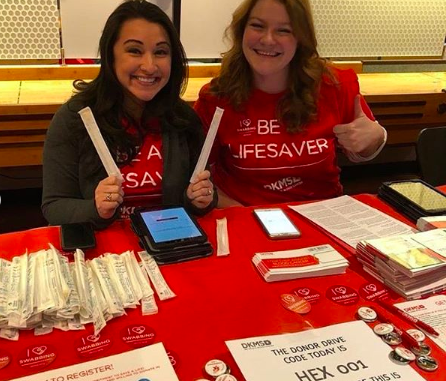
In correspondence with the German “Deutsche KnochenMarkSpenderdatei” (DKMS) or simply, German Bone Marrow Donor File, SUNY New Paltz Biology Club will be hosting a bone marrow drive on April 4 in Student Union Building 100N from 9 a.m. to 5 p.m.
In preparation for this event, the spring of 2018 Biology Club’s E-board members Skyped Jordan Segal, Virtual Drive Host
The drive is simple, as it only takes about 10 minutes to complete the screening with most of the time consisting of the video. Once watched, participants are given three swabs to swab the inside of their own cheeks. After being packaged into envelopes, the samples are sent to the DKMS main location where key proteins and components in the cells are identified and entered into a database. If someone needs a bone marrow transplant in the future, this database is referenced.
The DKMS is a registered international nonprofit organization founded by a man who lost his wife to leukemia. Based in Germany, their primary focus is hematopoietic stem cell transplantation in regards to blood cancers. DKMS raises awareness for blood cancers, as well as expanding sign-ups for national bone marrow registries.
Segal reached out to club member and Chondrosarcoma (a cartilage-based bone cancer) survivor, Ashley Fisher.
“I believe this drive is so important because finding a bone marrow donor match is so much harder than most people realize or understand; it doesn’t work like blood donations and just matching blood types, B+ with B+ or AB- and AB-, for example,” Fisher said. “The challenge to find ‘rare’ blood types like AB+ is much harder with HLA (human leukocyte antigen) types and matches, especially since they do differ in ethnicities.”
To find bone marrow transplant matches, HLA markers are relied on, which are found in immune system cells in bone marrow. In your immune system, HLA markers are limited, meaning there are only about eight to 10 of them. HLA senses cells that are foreign or familiar, and ultimately find which to defend the body from. In a reaction to an uneven match-up of immune system cells, your entire immune system could react.
“Since I faced a rare cancer that only really has a few principle treatment options, I know how hard it is, personally, to get treatment and find a way to beat it,” Fisher said. “It’s upsetting knowing that there can be people out there who can help others but don’t because they’re afraid or because they don’t know they can help, but that’s where we come in.”
Club president and treasurer Jared Weiler explains the significance of this event, as the importance of these screenings could change many lives because although many help, more must.
“Last year, we were very successful but unfortunately, once you participate and send in the swabs with samples from the inside of your cheeks, you’re already in the system and can’t do it again,” Weiler said. “We are looking to get all new people who would be interested in donating bone marrow if the system finds a match.”
This year, however, the club is more organized with the E-board and expect it to get even better. Weiler gives credit to the Engage platform and the new active members in their club.
“We’re hoping that we can get just as many people as last year, if not more,” Weiler said.
Although Fisher cannot donate as her past cancer makes her ineligible, she hopes “to do as much as [she] can to get others to screen to donate and help those going through similar things [she has] already experienced. As scary as ‘the big C’ may be, for those with diminished immune systems, a cold or strong flu strain could be scarier.”
If anyone is a match at the drive, they will be contacted and may be compensated for travel and pay loss fees. The Biology Club is looking for more males and people of diverse ethnic backgrounds because those specific HLA types and gene pools are smaller in donor numbers.
For more information, contact the NP biology club on Facebook, or at their room in CSB 113.
